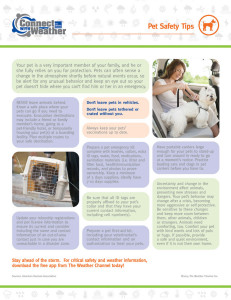Your pet is a very important member of your family, and he or she fully relies on you for protection.
Pets can often sense a change in the atmosphere shortly before natural events occur, so be alert for any unusual behavior and keep an eye out so your pet doesn’t hide where you can’t find him or her in an emergency.
- NEVER leave animals behind. Know a safe place where your pets can go if you need to evacuate. Evacuation destinations may include a friend or family member’s home, going to a pet-friendly hotel, or temporarily housing your pet(s) at a boarding facility. Plan multiple routes to your safe destination.
- Always keep your pets’ vaccinations up to date.
- Be sure that all ID tags are properly affixed to your pet’s collar and that they have your current contact information, including cell number(s).
- Update your microchip registrations and pet license information to ensure its current and consider including the name and contact information of an out-of-area contact just in case you are unreachable in a disaster zone.
- Prepare a pet emergency kit complete with leashes, collars, extra ID tags, water, medications, sanitation materials (i.e. litter and litter box), health/immunization records, and photos to prove ownership. Keep a minimum of 3 days supplies; ideally have 7-10 days supplies.
- Have portable carriers large enough for your pets to stand-up and turn around in to go at a moment’s notice. Practice loading cats and dogs in pet carriers before you have to.
- Prepare a pet first-aid kit, including your veterinarian’s contact information and authorization to treat your pets.
- Don’t leave pets in vehicles. Don’t leave pets tethered or crated without you.
- Uncertainty and change in the environment affect animals, presenting new stresses and dangers. Your pet’s behavior may change after a crisis, becoming more aggressive or self-protective. Be sensitive to these changes and keep more room between them, other animals, children or strangers. Animals need comforting, too. Comfort your pet with kind words and lots of pats or hugs. If possible, provide a safe and quiet environment, even if it is not their own home.
The Weather Channel and American Humane Association have put these tips together in a easily downloadable version, available here.
Source: American Humane Association

